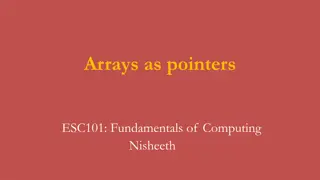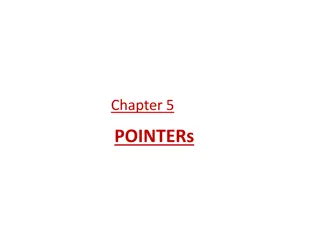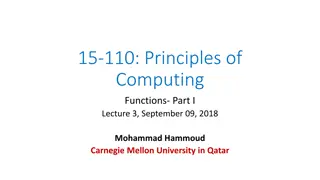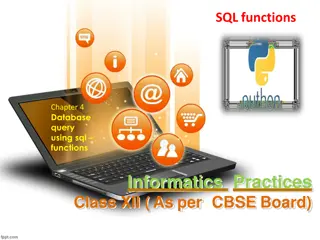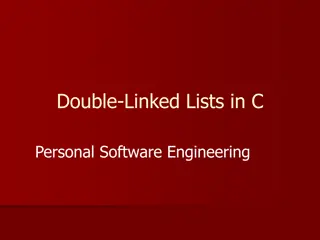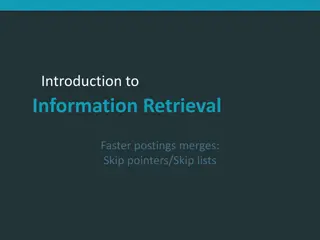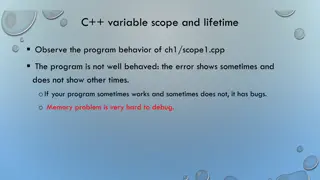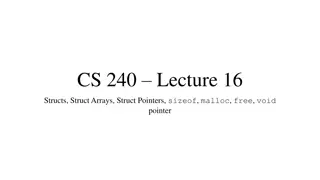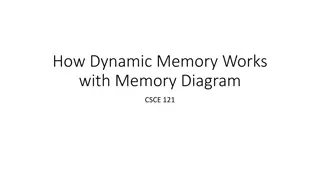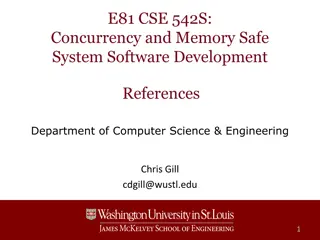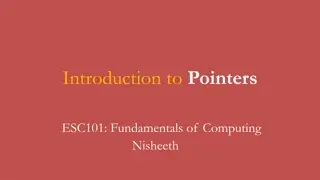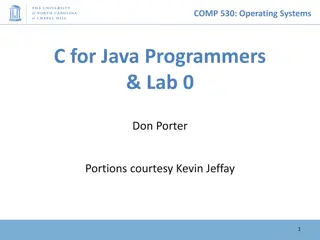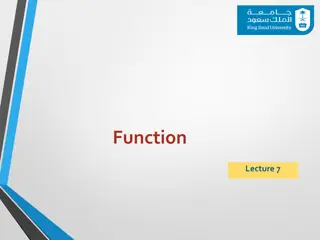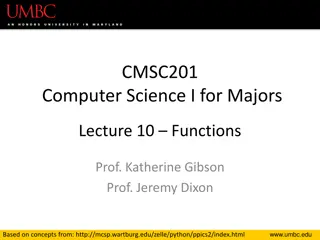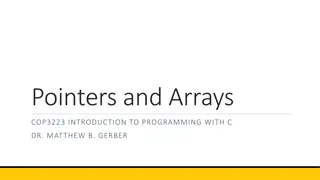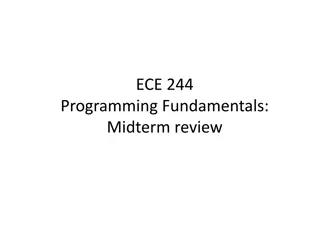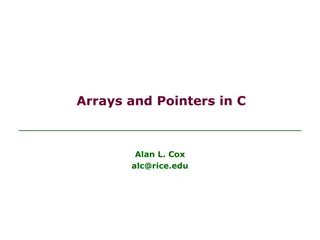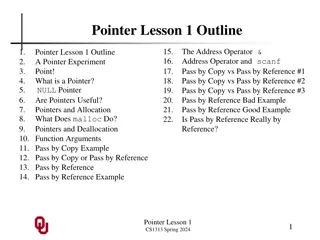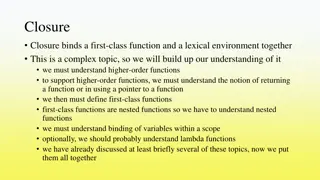Understanding Pointers and Functions in C++ Lecture
Exploring the concept of pointers and functions in C++, this lecture covers the basics of functions, passing arrays to functions, and understanding how pointers can be used in functions to manipulate data. Attendees will learn about passing entire arrays and returning multiple values using pointers.
Download Presentation

Please find below an Image/Link to download the presentation.
The content on the website is provided AS IS for your information and personal use only. It may not be sold, licensed, or shared on other websites without obtaining consent from the author. Download presentation by click this link. If you encounter any issues during the download, it is possible that the publisher has removed the file from their server.
E N D
Presentation Transcript
CMSC202 Computer Science II for Majors Lecture 04 Pointers Dr. Katherine Gibson www.umbc.edu Based on slides by Chris Marron at UMBC
Last Class We Covered C++ Functions Parts of a function: Prototype Definition Call Arrays Declaration Initialization Passing arrays to function 2 www.umbc.edu
Any Questions from Last Time? www.umbc.edu
Note Taker Still Needed A peer note taker is still needed for this class. A peer note taker is a volunteer student who provides a copy of his or her notes for each class session to another member of the class who has been deemed eligible for this service based on a disability. Peer note takers will be paid a $200 stipend for their service. Peer note taking is not a part time job but rather a volunteer service for which enrolled students can earn a stipend for sharing the notes they are already taking for themselves. If you are interested in serving in this important role, please fill out a note taker application on the Student Support Services website or in person in the SSS office in Math/Psychology 213. 4 www.umbc.edu
Todays Objectives To review functions and how they work To begin to understand pointers Pointers are a complicated and complex concept You may not immediately get it that s fine! To learn how pointers can be used in functions Passing in entire arrays Returning more than one value 5 www.umbc.edu
Functions and Arguments www.umbc.edu
Review of Functions Here is a simple function that adds one to an integer and returns the new value Definition: int AddOne (int num) { return num++; } Call: int enrolled = 99; enrolled = AddOne(enrolled); 7 www.umbc.edu
Function Arguments What is happening behind the scenes ? When the AddOne() function is called, the value of the variable is passed in as an argument The value is saved in AddOne s local variable num Changes made to x do not affect anything outside of the function AddOne() This is called the scope of the variable 8 www.umbc.edu
Scope Scope is the visibility of variables Which parts of your program can see a variable Every function has its own scope: The main() function has a set of variables So does the AddOne() function They can t see each other s variables Which is why we must pass arguments and return values between functions 9 www.umbc.edu
Addresses Every variable in a program is stored somewhere in the computer s memory This location is called the address All variables have a unique address Addresses are normally expressed in hex: 0xFF00 0x70BF 0x659B 10 www.umbc.edu
Array Addresses An array also has an address The location of the first element of the array char terry[6] = "hello"; We ll discuss arrays more later today 11 www.umbc.edu
Function Scope What happens when AddOne() is called? int age = 20; age = AddOne(age); The value of age is passed in, and stored in another variable called num What is the scope of each of these variables? age is in the scope of main() num is in the scope of AddOne() 12 www.umbc.edu
Function Calls The blue box represents scope The house shape is a variable s name, address, and value main() age 0x1000 20 13 www.umbc.edu
Function Calls When main() calls AddOne() The value is passed in, and stored in num main() AddOne() age num 0x1000 0x5286 20 20 14 www.umbc.edu
Function Calls When the AddOne() function changes num, what happens to the age variable? Nothing! main() AddOne() age num 0x1000 0x5286 20 20 21 15 www.umbc.edu
Function Calls How do we update the value of age? By returning the new value and assigning it to age main() AddOne() age num 0x1000 0x5286 20 21 21 16 www.umbc.edu
Function Calls What happens when the function returns? The function is over AddOne() and num are out of scope main() AddOne() And are no longer age num 0x5286 available to us! 0x1000 21 21 17 www.umbc.edu
Pointer Introduction www.umbc.edu
Pointers A pointer is a variable whose value is an address to somewhere in memory cout << "x is " << x << endl; cout << "ptr is " << ptr << endl; This will print out something like: x is 37 ptr is 0x7ffedcaba5c4 19 www.umbc.edu
Pointers Pointers are incredibly useful to programmers! Allow functions to Modify multiple arguments Use and modify arrays as arguments Programs can be made more efficient Dynamic objects can be used We ll discuss this later in the semester 20 www.umbc.edu
Creating Pointers A pointer is just like any regular variable It must have a type It must have a name It must contain a value To tell the compiler we re creating a pointer, we need to use * in the declaration int *myPtr; 21 www.umbc.edu
Pointer Declarations All of the following are valid declarations: int *myPtr; int* myPtr; int * myPtr; Even this is valid (but don t do this): int*myPtr; this is the most common way The spacing and location of the star ( * ) don t matter to the compiler 22 www.umbc.edu
Pointer Declarations Since position doesn t matter, why use this? int *myPtr; What does this code do? int *myPtr, yourPtr, ourPtr; It creates one pointer and two integers! What does this code do? int *myPtr, *yourPtr, *ourPtr; It creates three integers! 23 www.umbc.edu
Pointers and Regular Variables As we said earlier, pointers are just variables Instead of storing an int or a float or a char, they store an address in memory num ptr (where it lives in memory) 0x5286 0x560B address address 20 0xFF8A value value (where it points in memory) regular variable pointer variable 24 www.umbc.edu
Assigning Value to a Pointer The value of a pointer is always an ??? address To get the address of any variable, we use an ampersand ( & ) int x = 5; int *xPtr; // xPtr "points to" x xPtr = &x; 25 www.umbc.edu
Assigning to a Pointer All of these are valid assignments: int x = 5; int *ptr1 = &x; int *ptr2; ptr2 = &x; int *ptr3 = ptr1; 26 www.umbc.edu
Assigning to a Pointer This is not a valid assignment why? int x = 5; char *ptr4 = &x; Pointer type must match the type of the variable whose address it stores Compiler will give you an error: cannot convert int* to char* in initialization 27 www.umbc.edu
Making Pointers Point When we assign a value to a pointer, we are telling it where in memory to point to val // create both variables double val; double *ptr; // assign values val = 5.6; ptr = &val; 0xBB08 garbage 5.6 ptr 0x564F garbage 0xBB08 28 www.umbc.edu
The Asterisk and the Ampersand www.umbc.edu
Review: The Ampersand The ampersand Returns the address of a variable Must be placed in front of the variable name int x = 5; int *varPtr = &x; int y = 7; varPtr = &y; 30 www.umbc.edu
The Asterisk (or Star) The star symbol ( * ) has two purposes when working with pointers The first purpose is to tell the compiler that the variable will store an address In other words, declaring a pointer int *varPtr = &x; void fxnName (float *fltPtr); 31 www.umbc.edu
The Asterisk (or Star) The second purpose is to dereference a pointer Dereferencing a pointer means the compiler Looks at the address stored in the pointer Goes to that address in memory Looks at the value stored at that address ptr val address address 0x564F 0xBB08 0xBB08 5.6 value value 32 www.umbc.edu
Dereferencing What we do at that point depends on why the pointer is being dereferenced A dereference can be in three places On the left hand side of the assignment operator On the right hand side of the assignment operator In an expression without an assignment operator For example, a print statement 33 www.umbc.edu
Dereferencing Examples int val = *ptr; on the right hand side of the assignment operator Look at the value, but don t change it ptr val address address 0x564F 0xBB08 0xBB08 17 value value 34 www.umbc.edu
Dereferencing Examples *ptr = 36; on the left hand side of the assignment operator Access the variable and change its value ptr val address address 0x564F 0xBB08 0xBB08 17 36 value value 35 www.umbc.edu
Dereferencing Examples cout << "Value stored is " << *ptr; in an expression without an assignment operator Look at the value, but don t change it ptr val address address 0x564F 0xBB08 0xBB08 36 value value 36 www.umbc.edu
AddTwo() www.umbc.edu
The AddTwo() Function Let s create a new function that adds 2 to two integers So 22 and 98 will become 24 and 100 Can we do this with a regular function? (That is, without using pointers?) No! Functions can only return one value! We must use pointers to change more than one value in a single function 38 www.umbc.edu
The AddTwo() Function We want our function to look something like this pseudocode: // take in two ints, return nothing void AddTwo( <two integers> ) { // add two to the first int // add two to the second int // keep the values -- but how? } 39 www.umbc.edu
Passing Pointers to a Function To tell the compiler we are passing an address to a function, we will use int *varPtr void AddTwo (int *ptr1, int *ptr2) Just like int num tells the compiler that we are passing in an integer value int AddOne (int num) 40 www.umbc.edu
Writing AddTwo() Given that AddOne() looks like this: int AddOne (int num) { return num++; } How do we write the AddTwo function? void AddTwo (int *ptr1, int *ptr2) { } 41 www.umbc.edu
AddTwo() void AddTwo (int *ptr1, int *ptr2) { /* add two to the value of the integer ptr1 points to */ *ptr1 = *ptr1 + 2; /* add two to the value of the integer ptr2 points to */ *ptr2 = *ptr2 + 2; /* return nothing */ } 42 www.umbc.edu
Calling AddTwo() Now that the function is defined, let s call it It takes in the address of two integers Pass it two int pointers: AddTwo(numPtr1, numPtr2); Pass it the addresses of two ints: AddTwo(&num1, &num2); Pass it a combination: AddTwo(numPtr1, &num2); 43 www.umbc.edu
Literals and Pointers What about the following does it work? AddTwo(&15, &3); No! 15 and 3 are literals, not variables They are not stored in memory They have no address (They re homeless!) 44 www.umbc.edu
Announcements The course policy agreement is due today Project 1 has been released Found on Professor s Marron website Due by 9:00 PM on February 23rd Get started on it now! Next time: References And a review of pointers 45 www.umbc.edu





